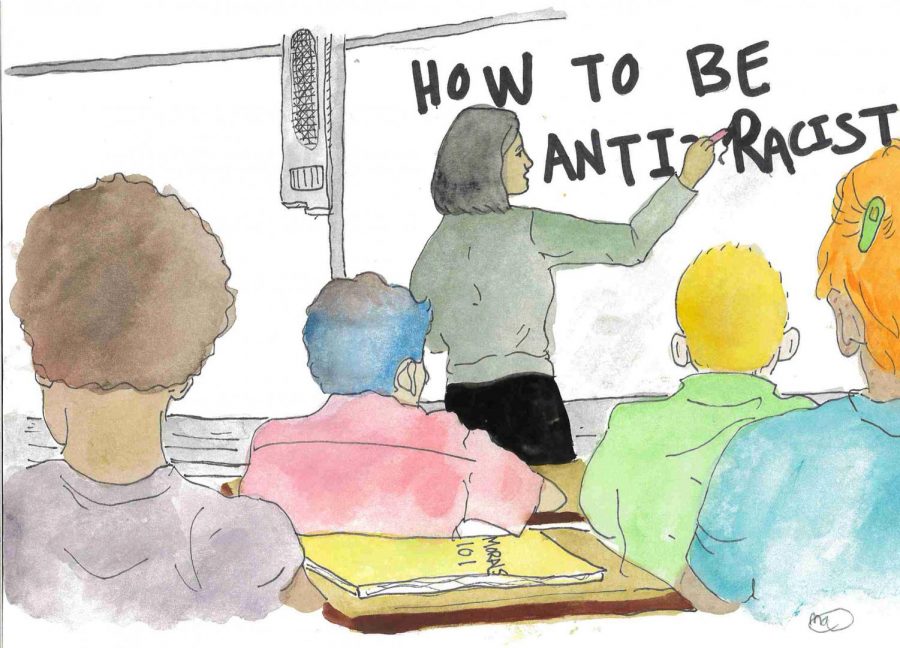Editorial: Anti-racism doesn’t end here
September 24, 2020
The events of this past summer have given new life to the Black Lives Matter movement. Countless Americans have stepped up and joined the fight against racism by protesting in the streets, supporting community organizations and looking out for their friends and neighbors. However, as the months pass after the murders of Breonna Taylor, George Floyd and Ahmaud Arbery, many who were once vocal about their newfound passion for racial justice have begun to fall silent. That needs to change.
These problems haven’t gone away. Racism is just as big of a problem as it was before on both systemic and interpersonal levels. Many people are starting to ignore it now because they feel less pressure to care. That can’t happen.
More than ever, we need to continue to work to combat racism. It isn’t enough to just not be racist—we all have to be actively anti-racist. We’re in this for the long haul and, if we want to make a meaningful impact, we have to be ready to continue this work for the rest of our lives.
So what can we do?
It’s clear that we need institutional change. But institutional change can only be brought about by a group of individuals each making the decision to work together toward that change, so make the choice. Call out racism when you see it. Talk to your friends and family—not only to educate those around you, but also to allow them to educate you. When you can, donate your time and resources to organizations that help marginalized communities. Most importantly, keep looking for ways to learn and to help.
If you’re actively looking for opportunities to be anti-racist, you’ll find them.
Whenever you find that you have power within an institution, use it. Here at The Maroon, we on the editorial board are trying to do what we can to combat the system inequalities in journalism. The Maroon is almost a century old. In that time, it has fallen short many times. We haven’t always given the unique struggles of Black people and other people of color the visibility they deserve. The diversity of our campus hasn’t always been represented in our day-to-day coverage of life at Loyola. We thank those who have held us accountable and pointed out our flaws. You have helped us get better. To others on campus: if you see a problem with our coverage, please point it out to us. We know we’re imperfect. We’re working on getting better.
This fall, we are conducting an internal audit of The Maroon with the help of others in the School of Mass Communication. In this audit, we are bringing in impartial observers to analyze our past few years of coverage to see where we have succeeded and where we have failed in representing the whole of the student experience. This will give us insight into how our coverage is flawed and how we can improve it.
We’re also starting The Maroon Alumni Board, an advisory board consisting of a rotating group of Loyola alumni who previously worked at The Maroon with a special emphasis on alumni of color. This advisory board will help us to improve by advising us on how to make our journalism not only more diverse and inclusive, but also more thoughtful and thorough in its approach to topics relating to race and racism. We hope that their direction will help us to become responsible journalists who advocate for our communities.
We are constantly looking for ways to include and advocate for marginalized groups in our newsroom. We are working to build relationships with minority student organizations on campus. We’re casting a wider net when sourcing stories and working to expand and diversify our newsroom. We say all this not in the hope that it makes us look better, but rather in the hope that we can all hold each other accountable and to show that we are willing to work to become the student newsroom that Loyola deserves.
College is a time to learn. That should include learning about the realities of the world around us—the systems that govern it and the oppression that mars it. We should always be open to learning about the experiences of others, even those whose experiences are similar to our own. Everybody always has more to learn about problems as deep and complex as systemic racism.
At the same time, college can be a time to unlearn. Take this opportunity to challenge your preconceived notions about the world around you. Unlearning racism, and internalized racism, is one of the most important things we can do at this point in our lives. We can all benefit from reading and learning about systemic injustice. Don’t shy away from these topics because they’re uncomfortable, lean into that discomfort. The more you learn, the better you can help to solve these problems.
Racism is a system, not an abnormality. Single actions that jump out to us as obviously racist are just symptoms of a much deeper, much broader problem. We can improve our communities through anti-racism, but it is going to take time and hard work and courage. If you’re new to this work, you need to recognize that you have a lot to learn from those who have been doing it for a long time. Even if you’re not new to it, you need to remember that you can always learn (and unlearn) more. How we respond to the problems around us defines who we are. Here at the Maroon, we are working to define ourselves as anti-racist. You should too.







